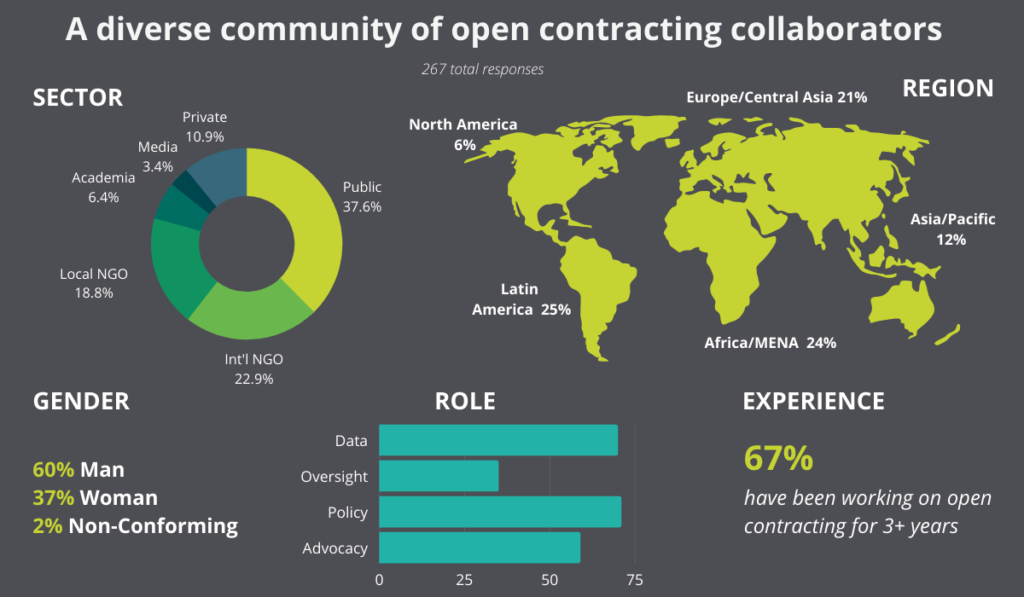How your feedback will help us build a stronger community in 2021

2020 was an important and busy year for OCP and for our global community, as public procurement was on the frontlines of the response to the COVID-19 pandemic. So, how did we do in helping support innovators and reformers during such momentous times? Over 260 partners gave us some great feedback. We heard loud and clear that community, connection, and collaboration are utmost in your minds. Read on to find out more and what we will be doing about it.

1. We asked: Are you feeling more empowered? You said: Yes, when OCP invests in my community.
Better empowering our partners was a priority for us in 2020, and COVID-19 made this even more urgent as we knew you had to meet the challenges posed by a wave of emergency procurement across government. When we asked if you feel more capable to do open contracting work with less OCP support in the future, 55% of you gave an enthusiastic “Yes!”. This is a notable 4% increase from last year, and average scores for this question significantly grew from 5.2 to 7.5 out of 10.
When we broke these responses down regionally, we saw a more nuanced story of empowerment. We were happy to see that when we do invest, you feel seen and supported. We received above average scores in regions like in Latin America where open contracting has been on the agenda for many years and a strong, collaborative community has emerged across multiple actors and projects. In areas such as the United States where our investment is newer, though, we received below average scores. This tells us where we need to invest going forward.
In terms of our net promoter score, based on how strongly you would recommend OCP to others, you also rated us highly at 84 out of 100. Last year’s net promoter score was 76, and we are happy to see this growth! A gender breakdown revealed room for improvement, as there was a disparity between men (93) and women (69). Empowerment, support, and belonging averages were also slightly lower for women. We take these scores seriously and want to make sure that we are adding value to everyone’s work.
What we’ll do: We’re growing our capacity across regions so that our support reaches more of you. In the U.S., we’re reviewing a round of exciting proposals for landscape research that will help us target our support for federal and local reforms. In Eastern Europe and Central Asia, Volodymyr Tarnay has just joined the team to grow our capacity as the community gets stronger at the regional level. In Asia, our team will keep up the momentum from measurable impact in Nepal and the Presidential Hackathon in Taiwan to pilot local implementation and build capacity with civil society across the continent.
We will also do better to integrate our own learning on gender and equity into our daily work, to ensure our support is felt by all. We have exciting partnerships on gender-responsive procurement coming up with the African Freedom of Information Centre & TISA in East Africa focused on women-led businesses, as well a deepening collaboration with UN Women.
Internally, we just hosted a session on inclusive project design with Miko Canares and will continue our own learning on this. The new community building strategy will also focus on ways we can better include those of you who may feel at the margins right now, including highlighting the profile of underrepresented reformers, including women and minorities.
2. We asked: How can we better support you? You said: Help us with high-level advocacy and building tools and resources.
In addition to community and peer connection (which we’ll discuss more below), you shared that you need more support in making the case for open contracting and generating political buy-in, as well as building tools around data use and publication, such as e-procurement systems, contract registers, and data visualizations.
While advocacy has come out as a top priority in past surveys, this time you noted that support is especially needed when making the case to decision-makers in government. There was a widespread call for sharing more best practices, use cases, and success stories across regions and globally in order to strengthen advocacy efforts. We recently shared a host of these, and we encourage you to explore them on our website.
Building tools was a new addition to the survey this year, and yet quickly rose to the top of your list of priorities. Overall, you said we’ve been helpful in this area, as 81% of you found our existing resources and tools to be very useful (up from 73% last year). But we can start by making our resources more easily accessible.
What we’ll do: In response to past calls for advocacy support, we are thrilled to have brought on Kristen Robinson as the new Head of Advocacy. She will develop a new advocacy support program and tools for our community, to be rolled out in April. We welcome your feedback and requests as we test and refine our advocacy support this year.
In terms of accessing tools and resources, by March, we will have an updated website with clearer wayfinding and new learning videos for data users and publishers. We will do more to feature and track resources created by other practitioners that you can adapt to your needs. The OCDS community is our existing forum where tool builders are sharing progress as well as common problems, and exchanging best practices.
Of course you can always request a training on how to apply these tools to your work, and we’re available for tailored advice when you’re stuck. Our lead data specialists Camila Salazar and Yohanna Lisnichuk (joining soon!) will work to meet your data needs, and our OCDS Helpdesk is always an email away at data@open-contracting.org.
3. We asked: What issue areas are important to you? You said: Civil society monitoring and e-procurement!
This year, we were also curious about which issues were top-of-mind for you, because we wanted to make sure we could target our support in the areas you need it most, and identify patterns to easily connect reformers from different regions on key topics. Civil society monitoring and e-procurement came out strongly in the lead, and we’re excited to see how we can continue our support to you here.
What we’ll do: We want to keep supporting civil society monitoring efforts as we now face the largest, worldwide public procurement effort in modern history: the COVID-19 vaccine. We’ve been working closely with a number of activist organisations and Transparency International’s Global Health program to put tools and resources for vaccine procurement monitoring into everyone’s hands. And we just brought in new partners to help us assemble the key information to track vaccine procurement and the money flows around it, which we will then turn into widespread guidance.
In terms of e-procurement, this tracks with the need you all expressed for more support in building tools for e-procurement systems and more, and we hear you. We’re in the midst of improving our eGP implementation guidance for 2021, and we are always keen to collaborate with the community on new approaches to eGP that are truly transformative. And as I shared above, we’re happy to offer advice and best practices as you build the tools you need to implement procurement reforms and open up data.
4. We asked: How strong is the open contracting community right now? You said: Pretty strong, but let’s connect even more.
We know that supporting a diverse and empowered community around open contracting is just as important as setting data standards and providing technical assistance. A network of practitioners and advocates working together around the world is key to reaching impact at scale—and we collaborate best when we feel we belong to a larger community of peers working toward the same mission, openly exchanging guidance and cheering each other on.
So, this year we asked for the first time: How much do you feel that you belong? You told us we have a strong open contracting community (with an average score of 7.2 out of 10) but there is still room for improvement, as your number one request was for more opportunities to connect to peers.
What we’ll do: One of our biggest investments in the community is the Senior Community Building Manager position, where I’m excited to explore OCP’s role not only as a source of technical expertise, resources, and support, but also as a facilitator and convener. I really care about building communities that are inclusive and equitable, and I’m always happy to hear from you, so please reach out to me at kbwenge@open-contracting.org and keep an eye out for our new community strategy and website page.
A key shift in this strategy will be a renewed focus on regional community building that can strengthen local networks and on-the-ground problem-solving. One of our recent investments in regional network building is through our new Senior Manager for Africa, Nkechi Coker, a strong community-builder who is working with partners on the continent and with journalists across regions. At the international level, we are planning for our next Open Contracting Global event where we’ll highlight the profiles and stories of champions from across the globe (we know lots of you are eager—as are we!—for the day we can all gather in-person safely again). Until then we’ll continue to provide high-quality virtual connections, and we’re revisiting our online Learning Circles model to provide stronger facilitation and even more opportunities for partners to connect on the topics that matter most to you.
Coming together in 2021
2020 helped prove that a true, empowered community has the power to be transformative. In the world of open contracting, teams of reformers, journalists, and activists came together across sectors and borders to expose procurement corruption and help ensure critical medical equipment reached communities—and saved lives.
As we work toward systemic change through public procurement, and continue to see progress on stories of real and sustained impact, we want to equally recognize the importance of strengthening this community of reformers. We will invest this year in creating more belonging by bringing in new regions, empowering women and other underrepresented groups, and giving you more tools for your advocacy and data initiatives. We will work as a facilitator to connect you to your peers for problem-solving and support. And our new community building strategy will include updated targets to better track cross-collaboration within the community.
We value your inputs, especially as we explore and deepen this new dimension of our work, so please feel free to reach out to me with any questions or comments at kbwenge@open-contracting.org.